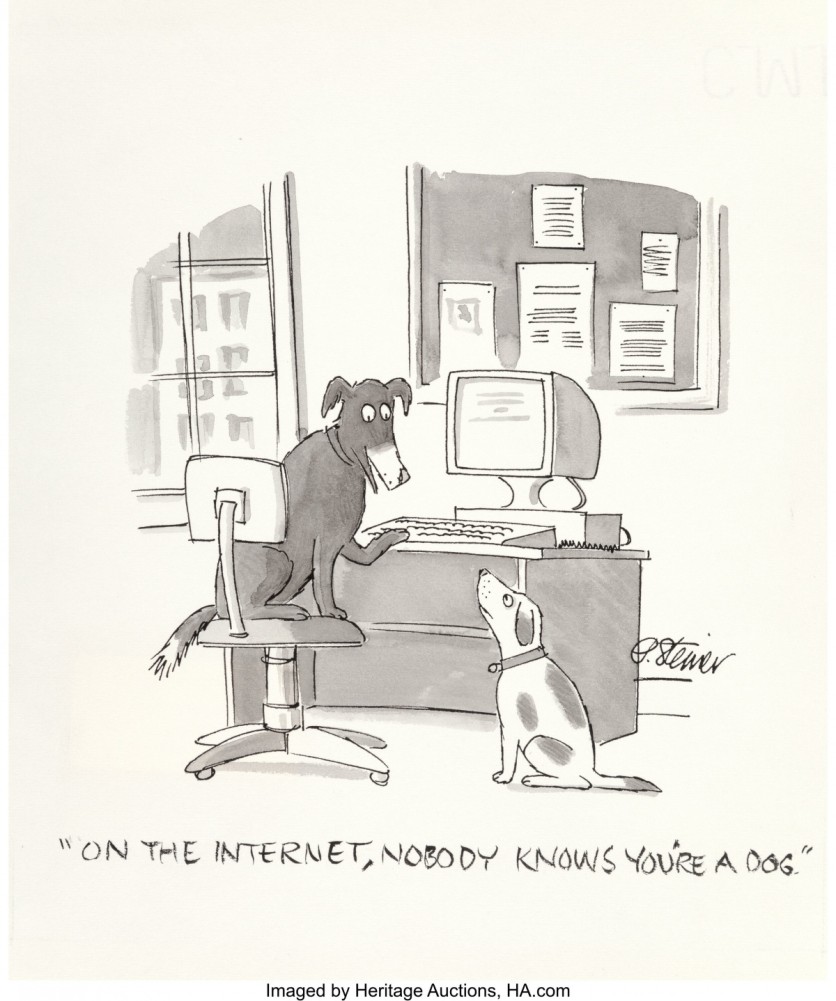An iconic relic of internet culture is now up for sale: the cartoon captioned "On the Internet, nobody knows you're a dog" initially published by The New Yorker on July 5, 1993.
According to Heritage Auctions, this enduring image encapsulates the idea of online anonymity and its power to transcend societal judgments.

'Nobody Knows You're a Dog'
The artwork's creator, Peter Steiner, sheds light on its unexpected popularity. Initially, it was just one sketch among many, conceived in search of a punchline.
Yet, over the years, requests to reproduce it surged, leading to its appearance on various platforms, from books and magazines to T-shirts and coffee cups. Despite its initial modest reception, this cartoon held historical significance.
By incorporating the term "Internet" in 1993, it marked a pivotal moment in the popularization of the word. This was an era when America Online and dial-up modems were the norm, and even then, some were grappling with understanding the concept of the internet.
The cartoon managed to succinctly capture this evolving landscape. Beyond its visual impact, the cartoon inspired a play by Alan Perkins titled "Nobody Knows I'm a Dog" in 1995, which delved into the idea of personas in cyberspace.
It's also been playfully parodied, even within the pages of The New Yorker itself. Steiner recognized its enduring cultural relevance, emphasizing how it's often included in publications discussing internet-related topics as a nod to its cultural impact.
"If you publish a book about communications, if you publish a book about the internet, if you publish a book about anything related to the internet, if you don't include the cartoon, people think you haven't done your homework," Steiner said in a press statement. "So I think a lot of people publish the cartoon just out of obligation."
Read Also : [Viral Culture] How These People Became Memes: 'Hide the Pain Harold,' 'Disaster Girl,' 'Gavin,' and MORE
Transcending The New Yorker
As the landscape of online anonymity transforms, the cartoon's message remains pertinent. In a world of heightened surveillance, the concept of true anonymity is challenged, giving rise to various avatars and layers of disguise, according to longtime New Yorker cartoonist and cartoon editor Robert Mankoff.
Originally a gem in The New Yorker's collection, this cartoon has transcended its origins, becoming a cultural touchstone in the ongoing narrative of internet identity.
"I would think many people who know of this cartoon have no idea that it appeared in The New Yorker. Its resonance in the culture remains... I mean, you could look at the cartoon in one way: that in a surveillance state, everybody knows who you are," Mankoff said.
"On the other hand, to combat surveillance, there are all these avatars and façades and layers of disguise. It's really an amazing cartoon in that it transcends The New Yorker," he added.
Related Article : Disaster Girl Meme NFT Sells for Around $500K Falling Short of $105K In Comparison to the Nyan Cat


![Apple Watch Series 10 [GPS 42mm]](https://d.techtimes.com/en/full/453899/apple-watch-series-10-gps-42mm.jpg?w=184&h=103&f=9fb3c2ea2db928c663d1d2eadbcb3e52)


